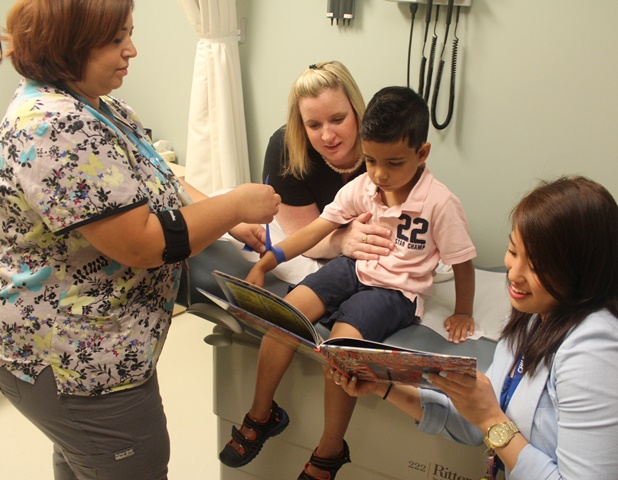In a quiet corridor at Trillium Health Partners’ (THP) Credit Valley Hospital (CVH), in Mississauga, is a bright open space where children can learn, play and express themselves through words and actions. It’s a place where medicine and children meet in the middle, where clinical care and play find a happy balance, and where children – regardless of why they’re at the hospital – can be children.
This special sanctuary is the Regional Paediatric Patient Care Unit.
The unit has introduced a number of patient-centred programs and initiatives with the purpose of helping create a positive environment for young patients and their families. Child Life Specialists and nurses work around the clock with a focus on helping children maintain normal living patterns and routines, while continuing to promote self-expression and education. There’s even a resident clown, Bug, who’s bright and cheerful demeanor aims to minimize the stress that can come along with treatment and a hospital stay.
One specific program aimed at reducing the stress children can experience in hospital is the Poke Program. Launched in 2014, it is designed for children who may be faced with daunting procedures such as IV drips or bloodwork. A “Poke Plan”, created by the child’s parent or caregiver, along with the child, outlines how the child copes with excitement or fear, happiness or difficult moments both in and out of the hospital. Sandy Rolston, a Clinical Nurse Educator for the paediatric program at Trillium Health Partners, describes the program as empowering. “The main goal of the program is to engage our young patients and their families to take part in their care. Typically they feel that they don’t have a lot of say about a procedure and this gives them that opportunity, thereby decreasing anxiety and hopefully any pain that they may experience.”
By having this information, nurses can better understand the specific needs of each patient and employ special techniques prior to procedures, while continuing to allow the family to have a voice and choice around their child’s care. The program makes use of four key elements to help support young patients: comfort holds; one voice; distraction; and best words.
These four elements are important to improving the patient experience, explains Martha McLeod, a Child Life Specialist at Trillium Health Partners. “It is a change to regular practice, so often we would have a patient lie down to get a needle, but in some cases that doesn’t work for them. With the Poke Plan we can ask ‘Would you like to lie down or sit up? Would you like to play on your iPad or sing a song with Mom?’ ” Offering children these choices in their care provides the empowerment the Poke Program aims to address.
The Poke Program continues to receive positive feedback from young patients and their families, who have benefitted from the program’s patient-centred approach and the close relationship it fosters with Trillium Health Partners’ healthcare providers.


